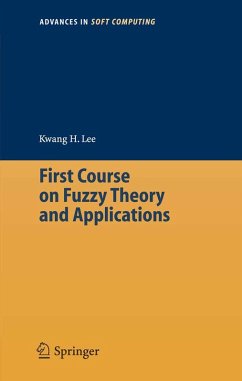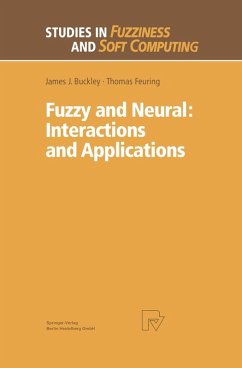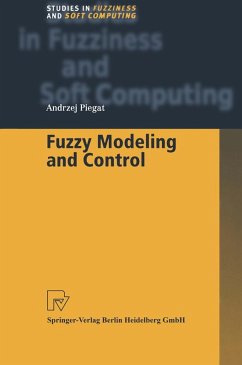
An Introduction to Fuzzy Logic and Fuzzy Sets (eBook, PDF)
Versandkostenfrei!
Sofort per Download lieferbar
52,95 €
inkl. MwSt.
Weitere Ausgaben:

PAYBACK Punkte
26 °P sammeln!
This book is intended to be an undergraduate introduction to the theory of fuzzy sets. We envision, sometime in the future, a curriculum in fuzzy sys tems theory, which could be in computer /information sciences, mathematics, engineering or economics (business, finance), with this book as the starting point. It is not a book for researchers but a book for beginners where you learn the basics. This course would be analogous to a pre-calculus course where a student studies algebra, functions and trigonometry in preparation for more advanced courses. Chapters 3 through 11 are on fuzzy algebra, fu...
This book is intended to be an undergraduate introduction to the theory of fuzzy sets. We envision, sometime in the future, a curriculum in fuzzy sys tems theory, which could be in computer /information sciences, mathematics, engineering or economics (business, finance), with this book as the starting point. It is not a book for researchers but a book for beginners where you learn the basics. This course would be analogous to a pre-calculus course where a student studies algebra, functions and trigonometry in preparation for more advanced courses. Chapters 3 through 11 are on fuzzy algebra, fuzzy functions, fuzzy trigonometry, fuzzy geometry, and solving fuzzy equations. However, after this course the student doesn't go on to calculus but to more specialized courses in fuzzy systems theory like fuzzy clustering, fuzzy pattern recogni tion, fuzzy database, fuzzy image processing and computer vision, robotics, intelligent agents, soft computing, fuzzy rule based systems (control, expert systems), fuzzy decision making, applications to operations research, fuzzy mathematics, fuzzy systems modeling, etc. Therefore, very little of most of these topics are included in this book. There are many new topics included in this book. Let us point out some of them here: (1) mixed fuzzy logic (Section 3.5); (2) three methods of solving fuzzy equation/problems (Chapter 5); (3) solving fuzzy inequalities (Chapter 6); (4) inverse fuzzy functions (Section 8.5); (5) fuzzy plane geometry (Chap ter 9); (6) fuzzy trigonometry (Chapter 10); and (7) fuzzy optimization based on genetic algorithms (Chapter 16).
Dieser Download kann aus rechtlichen Gründen nur mit Rechnungsadresse in A, B, BG, CY, CZ, D, DK, EW, E, FIN, F, GR, HR, H, IRL, I, LT, L, LR, M, NL, PL, P, R, S, SLO, SK ausgeliefert werden.












